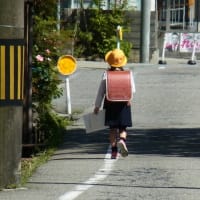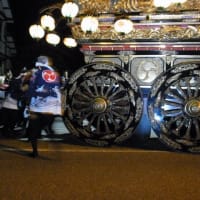■ Angelopoulosアンゲロプロスの死、 Schumannシューマン の演奏 ■
2012. 2. 3 中村洋子

★厳冬の二月に、なりました。
身を切られるような寒風、東京でも、霜柱が立ち、
北陸、東北の日本海側は、豪雪に見舞われています。
私は、一月末ごろ、微振動が途切れることのない東京を離れ、
すこし集中して、作曲をしていました。
★そうしたなか、ギリシアの監督 Theodoros Angelopoulos
テオ・アンゲロプロス(1935年生)の急逝を知り、衝撃を受けました。
私の最も愛する、映画監督でした。
交通事故死。
“ 旅に生き、旅に死んだ人 ” です。
★以前は、自宅以外での作曲は、想像できませんでしたが、
楽譜や資料で、雑然としたピアノ室ではなく、
ピアノ以外は、何もない、貸し練習室で、
音を紡いでいくことが、ようやく、できるようになりました。
この方が、心地よくなりました。
テレビ、新聞がなく、インターネットを見ない生活は快適です。
★Beethoven ベートーヴェン(1770~ 1827)が、
引っ越し魔であったことが、理解できるようになりました。
手元に集めて、置いておきたい楽譜や資料は、
実は、ごくわずかなのです。
勉強は、常にしなくてはなりませんので、楽譜はたくさん求めますが、
その楽譜の音楽と、対峙する 「 一瞬 」 が大切であり、
心と頭に、強く焼き付けたら、もうそれでいいのです。

★手元になくてはならない楽譜は、そんなに多くはありません。
今回は、 Bach 「 Wohltemperirte Clavier 平均律クラヴィーア曲集 」 と、
Robert Schumann ロベルト・シューマン (1810~1856) 、
Camille Saint-Saëns カミーユ・サンサーンス(1835~1921)
Dvořák ドヴォルザーク(1841~1904) の、
「 チェロ協奏曲 」 が入った楽譜だけを、持参しました。
★チェロ協奏曲のなかで、飛び抜けた傑作は、
やはり、 Schumann です。
Wolfgang Boettcher ヴォルフガング・ベッチャー先生のお父様の、
親友だった作曲家 Paul Hindemith ヒンデミット (1895年~1963)の
「 Schumann のチェロ協奏曲は、あらゆる協奏曲のモデル
(模範、手本)である 」 という言葉を、私は、
Boettcher 先生から、何度も聴きましたが、
その通りであると、思います。
★冒頭の 1 ~ 3小節目 の、三つの和音に、
Bach が既に、 その翼を、大きく広げているのです。
驚きです。
私のアナリーゼ講座を、お聴きになっている方には、
即座に、その意味がお分かりになると思います。
この Schumann の協奏曲が、 Hindemith の チェロ協奏曲
「 Konzert für Violoncello und Orchester (1940 ) 」 に、
つながっていくのは、自明の理です。
この曲は、Paul Tortelier ポール・トルトゥリエ (1914~1990年) の
名演奏が、あります。

★Robert Schumann ほど、日本で誤解されている作曲家も、
少ないかもしれません。
クララとの恋愛うんぬんを、面白おかしく仕立てた、
通俗恋愛映画の影響も、大きいのでしょうが、
“ ロマン派特有の、ものに憑かれたように、
感情の赴くままに作曲し、遂には精神の均衡まで崩した人 ”、
即ち、≪ あまり理性的、理知的ではない作曲家 ≫
というイメージが、植え付けられ、覆いかぶさっているのです。
しかし、彼ほど、強固な構成力をもった作曲家はいないのです。
★逆にいいますと、 Schumann の曲を聴いて、
「 何かつまらない、物足りない 」 と 、感じる場合、
演奏家に、作品の構造を読み取る力がないだけである、
ともいえるのです。
★先日、TVでたまたま、世界的に有名な音楽家たちによる、
シューマンの 「 ピアノ五重奏曲 」 を、放送していました。
指はよく回り、巨匠らしいムードを、
顔の表情や演奏の仕草で、漂わせていましたが、
Schumann の大きな構造には、近寄ることができず、跳ね返され、
その周辺を、まさぐっているだけ、という印象を受けました。
★TVを、ご覧になっていた方のなかには、
≪ 世界的に有名な音楽家による Schumann シューマンだから、
これが、 Schumann シューマンの音楽なのであろう、
しかし、この演奏を聴いて、自分は感動しない、よく分からない、
だから、シューマンはやはり苦手である ≫ と思われた方が、
大勢いらっしゃったのではないか、と危惧します。
シューマンの本質に迫らない演奏で、シューマンを判断することは
( あるいは、判断させられることは ) 、非常に不幸なことです。
クラシック音楽の衰退に、つながってしまいます。

★Angelopoulos テオ・アンゲロプロス については以前、
このブログで、書きました。
http://blog.goo.ne.jp/nybach-yoko/e/10735286a3c284d84300dbaa32487baf
芭蕉も、ユリシーズも、そしてアンゲロプロスも、
旅の途中の死により、永遠の漂泊者となりました。
★私は、 ≪ ユリシーズの瞳 ≫ ( ギリシア語の原題は
「 オデュッセウスのまなざし 」 、英語 「 ULYSEES'GAZE 」 、
仏語 「 LE REGARD D'ULYSSE 」 )が、
彼の最も優れた作品である、と思いますが、
Palme d'Or を取ってはいないので、
日本のマスコミ訃報記事では、触れられていません。
残念なことです。
http://www.youtube.com/watch?v=siw-1YQPvDQ
Theo Angelopoulos Ulysses' Gaze Sarajevo Scenes
★歴史に永遠に残る、本当に素晴らしい作品が、
その時代の、コマーシャリズムに立脚した 「 賞 」 を、
取るとは限らない、ということの、好例かもしれません。
凡庸で、世俗的価値に左右される jury が、
その作品の真価を理解できなければ、当然のことです。
これは、どの時代の、どの世界についてでも、
当てはまることでしょう。

★“ギリシャの黒澤明”アンゲロプロス監督が事故死…新作撮影中、バイクにはねられる (2012年1月26日 スポーツ報知)
「旅芸人の記録」やカンヌ国際映画祭パルムドール(最高賞)を受賞した「永遠と一日」などで知られる、ギリシャの巨匠テオ・アンゲロプロス監督が24日(日本時間25日)、アテネ郊外で新作映画の撮影中、バイクにはねられて死去した。76歳だった。1970年に「再現」で長編デビュー。長回し撮影による映像など、独自の手法を貫いた。日本の多くの映画監督にも影響を与えた巨匠の突然の死は、世界中の映画人とファンに悲しみを与えた。
独特の長回しや曇天にこだわっての撮影、360度をなめ回すようにカメラを動かすなど、かたくなに独自の手法を貫き、地位を築き上げたアンゲロプロス監督が、撮影中の事故で突然この世を去った。
AP通信などによると、アンゲロプロス2 件監督は首都アテネ近郊のピレウス港付近に建設されたセットで最新作「The Other Sea(もう一つの海)」を撮影していた。道路を渡ろうとしたところ、走ってきたバイクにはねられ、頭を強打。すぐにアテネ市内の病院に搬送されたが、治療のかいなく、死亡が確認されたという。バイクを運転していたのは非番の警察官で、こちらも重傷を負った。事故現場は、トンネル内だったという話もある。
監督は母国・ギリシャの自然と歴史の中で生きる人間の姿を、哲学的に描き出すことで知られた。長回し撮影で、セリフが少なく、静かに時間が経過していく作品が多いことから、ギリシャでは「寝付きの悪い子には、アンゲロプロス2 件の映画を見せろ」と、ことわざ的に使われることもあった。
また、黒澤明監督と交流があったことでも知られ、昨年の東京国際映画祭で上映されたドキュメンタリー映画「黒澤、その道」(カトリーヌ・カドゥ監督)でも思い出を語っていた。
最新作「The―」は、20世紀のギリシャを描く第1弾「エレニの旅」(05年)、第2弾「第三の翼」(年内公開予定)に続く新たな三部作の第3弾。世界恐慌前の1928年のギリシャを舞台にした風刺劇という。監督は「今年中には完成させたい」と話しており、来年のカンヌ国際映画祭への出品を予定していたという。
◆テオ・アンゲロプロス2 件 1935年4月27日、ギリシャ生まれ。アテネ大学を卒業後、仏パリのソルボンヌ大学に留学。中途退学後はギリシャに戻り、映画評を書きながら過ごす。68年、初監督作の短編「放送」を発表。70年に「再現」で長編デビュー。75年の「旅芸人の記録」で名声を確立。80年、「アレクサンダー大王」でベネチア国際映画祭金獅子賞(グランプリ)、98年には「永遠と一日」でカンヌ国際映画祭の最高賞パルムドールを受賞。
★Theo Angelopoulos obituary
http://www.guardian.co.uk/film/2012/jan/25/theo-angelopoulos
Film director with a magisterial style who excelled at historical and political allegories
Ronald Bergan
guardian.co.uk, Wednesday 25 January 2012 16.00 GMT
Angelopoulos's The Weeping Meadow (2004), the first film of a planned trilogy, spans 30 years of Greek history, from 1919 to 1949. Photograph: AP
The Greek film director Theo Angelopoulos, who has died aged 76 in a road accident, was an epic poet of the cinema, creating allegories of 20th-century Greek history and politics. He redefined the slow pan, the long take and tracking shots, of which he was a master. His stately, magisterial style and languidly unfolding narratives require some (ultimately rewarding) effort on the part of the spectator. "The sequence shot offers, as far as I'm concerned, much more freedom," Angelopoulos explained. "By refusing to cut in the middle, I invite the spectator to better analyse the image I show him, and to focus, time and again, on the elements that he feels are the most significant in it."
Theo Angelopoulos in 1986. Photograph: Jerome Prebois/Kipa/Corbis
Angelopoulos was born in Athens, where he studied law. After military service, he went to Paris to attend the Sorbonne but soon dropped out to study at the IDHEC film school (now known as La Fémis). Back in Greece, he worked as a film critic for the leftist daily Allagi, which was closed down by the military junta that came to power in 1967. The seven-year regime of "the colonels" was seared into his consciousness and remained a subject – overtly or subliminally – throughout his oeuvre.
His elliptical style was born partly out of the restrictive atmosphere of the epoch during which he managed to make his first feature, Reconstruction (1970). Shot in spare, high-contrast black and white, it was about a Greek migrant worker who returns from Germany and is murdered by his wife and her lover. It was immediately clear that the director was less interested in the crime story than the ideological, individual and collective implications of the murder inquiry.
Angelopoulos then emerged on the international scene with his impressive historical triptych, Days of '36 (1972), The Travelling Players (1975) and The Hunters (1977), the most ambitious Greek films to date. Shot by Giorgos Arvanitis, the cinematographer on almost all of Angelopoulos's films, they are long, contemplative studies of modern Greek history.
Days of '36, based on actual events, tells of a man arrested for the murder of a trade unionist. Protesting his innocence, he holds a politician hostage in his cell, threatening to kill the man, and himself, unless he is released. The film subtly undermined the military regime in its portrayal of official incompetence. Given its physical confines, and the fact that the prisoner remains out of sight for much of the time, the high level of tension is a real achievement.
In The Travelling Players, set in 1952, a troupe of actors recall Greek political history and their own personal histories since they last visited the country, in 1939. Nearly four hours long, the film consists of just 131 shots, allowing the audience time to assess the situation rationally. The Hunters follows the eponymous group across a snowy mountainside in northern Greece as they come across the body of a Greek guerrilla fighter killed in 1949. At the subsequent inquest, each member of the group, as well as various peasants and workers, speaks of his experience of the civil war and the years that followed. Shot in pastel shades, the film slowly unravels the various strands in this inquisition of the right, using dream, memory and fantasy, and the powerful symbol of the corpse as the silent accuser.
In Voyage to Cythera (1984), the first of what Angelopoulos called the "trilogy of silence", an old man who fought with the communists during the civil war returns to Greece after more than 30 years' exile in the Soviet Union. He attempts to come to terms with his country and his wife and family, whom he hardly knows. The second, The Beekeeper (1986), was the first of Angelopoulos's films to use well-known actors, in this case Marcello Mastroianni as a morose, retired schoolteacher who sets off on a trip around the beehive sites of Greece, picking up an enigmatic young female hitchhiker on the way.
This compelling film could be called a metaphysical road movie, as could Landscape in the Mist (1988), the third in the sequence and the first of his films to feature children. Here, a 14-year-old girl and her little brother embark on a journey to find their father, whom they believe to be in Germany. In fact, it is an existential odyssey, a voyage towards the unattainable.
Harvey Keitel starred in Ulysses' Gaze (1995) as another character who returns to Greece from exile. He is a film-maker, back from the US, seeking some lost reels of films made by two famous Greek film-makers during the silent era. The film won the grand jury prize at Cannes. Uncharacteristically, Angelopoulos expressed his disappointment that it did not win the Palme d'Or. He told a shocked and suddenly silent audience: "If this is what you have to give me, I have nothing to say," before walking off the stage without even posing for pictures.
Cannes made amends three years later when Eternity and a Day (1998) won the festival's top prize. The film is a philosophical meditation about a dying writer, played by Bruno Ganz, and his thoughts on family, art and mortality. Angelopoulos executes the transition between present and past brilliantly, gliding easily between uncertain reality and nostalgia.
The Weeping Meadow (2004) was the first of what Angelopoulos planned as a trilogy. The mytho-poetic dimension of the film – a magical fusion of colours, sounds, music and images which expresses the deepest feelings surrounding life and death – is linked, as usual, to a strong political and social context. The film spans 30 years of Greek history, from the exodus of the Greek colony in Odessa under the threat of the Red Army in 1919 to the end of the civil war in 1949.
The Dust of Time (2008) covered the second part of the 20th century, venturing outside Greece for the first time. The Greek-German-Italian-Russian co-production, mainly in English, had all the makings of a Europudding, albeit one made by a master chef. Not all these fears were allayed. The Dust of Time is a fin-de-siècle drama, a cry of pain derived from the wounds inflicted during the previous century.
Angelopoulos's latest film, The Other Sea, was to be about Greece's financial crisis. While filming in Athens' main port, Piraeus, he was in collision with a motorcycle as he crossed a road. He died later in hospital.
He is survived by his wife, Phoebe, and three daughters.
• Theodoros Angelopoulos, film director, born 27 April 1935; died 24 January 2012

★Posted on Tuesday, 01.24.12
Greek filmmaker Theo Angelopoulos dies in accident
The Associated Press
http://www.miamiherald.com/2012/01/24/2605964/greek-filmmaker-theo-angelopoulos.html
ATHENS, Greece -- He was known for his slow and dream-like directing style and had enough stamina at 76 to be working on his latest movie.
But award-winning Greek filmmaker Theo Angelopoulos was killed in a road accident Tuesday after being hit by a motorcycle while walking across a road close to a movie set near Athens' main port of Piraeus.
The driver, who was also injured and hospitalized, was later identified as an off-duty police officer.
The accident occurred while Angelopoulos was working on his upcoming movie "The Other Sea."
Angelopoulos had won numerous awards for his movies, mostly at European film festivals, during a career that spanned more than 40 years.
In 1995, he won the Grand Jury Prize at the Cannes Film Festival for "Ulysses' Gaze," starring American actor Harvey Keitel. Three years later, he won the main prize at the festival, the Palme d'Or, for "Eternity and a Day," starring Swiss actor Bruno Ganz.
"The atmosphere, symbolism and historical context of his cinematic storytelling went beyond the art form that he worked in and inspired young filmmakers," Greek President Karolos Papoulias said Wednesday. "(This) occurred at a time when he was extremely creative and the country was in need of his insight, making his absence all the more painful."
Survived by his wife Phoebe and three daughters, Angelopoulos is to be buried Friday at Athens' First Cemetery.
Greece's state Ambulance Service, meanwhile, has ordered an inquiry into reports that paramedics arrived at the scene of the accident 45 minutes after they were called.
Born in Athens in 1935, Angelopoulos lived through the Nazi occupation of Greece during World War II and the ensuing 1946-49 Greek civil war - recurring themes in his early films.
He studied law at Athens University, but eventually lost interest and moved to France where he studied film at the Institute of Advanced Cinematographic Studies in Paris.
After returning to Greece, he worked as a film critic for a small, left-wing newspaper and started to make films during Greece's 1967-74 dictatorship.
Described as mild-mannered but uncompromising, Angelopoulos' often sad and slow-moving films mostly dealt with issues from Greece's turbulent recent history: war, exile, immigration and political division.
It was not until 1984 with "Voyage to Kythera" that his scripts were written in collaboration with others.
Angelopoulos attracted mostly art-house audiences, using established actors including Marcello Mastroianni and Jeanne Moreau in two of his most widely acclaimed films, "The Bee Keeper" and "The Suspended Stride of the Stalk."
His bleak landscapes, slow editing pace and long spells without any dialogue meant his movies did not always please filmgoers or critics.
American film critic Roger Ebert wrote of "Ulysses' Gaze": "There is a temptation to give 'Ulysses' Gaze' the benefit of the doubt: To praise it for its vision, its daring, its courage, its great length. But I would not be able to look you in the eye if you went to see it, because how could I deny that it is a numbing bore?"
In a rare television interview last year, Angelopoulos said his next film was to be about Greece's major financial crisis. He publicly called on rival political parties to work together to try and ease the hardships facing many Greeks.
"I remain a leftist in total confusion," he told state-run NET television.
Several months later, the country's two main rival political parties agreed to form a coalition government to tackle Greece's enormous debt problems.
"This is an emergency situation. We must realize this. So we must all examine what can be done - the left and right. This is my plea," he said in the interview. "I am afraid of what tomorrow will bring."
★2月は三カ所で、アナリーゼ講座があります。
KAWAI表参道、KAWAIみなとみらい、KAWAI名古屋です。
お時間がございましたら、どうぞ、お出かけください。

※copyright © Yoko Nakamura
▼▲▽△無断での転載、引用は固くお断りいたします▽△▼▲

























